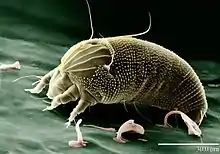ērce
Latgalian
Latvian

Ērce
.jpg.webp)
Ērce
Etymology
From Proto-Baltic *erkyā- (with er̄ > ē:r), from Proto-Indo-European *er- (“to tear, to pierce”) (whence also ērkšķis (“thorn”), q.v.) with an extra -(e)k. The original meaning was probably “one who pierces, tears.” Cognates include Lithuanian érkė, Sanskrit ऋक्षरः (r̥kṣaraḥ, “sting, thorn, spike”), रक्षः (rákṣaḥ, “harm”), Ancient Greek ἐρέχτω (erékhtō, “to tear, to claw”), Latin rīcinus (“sheep, dog parasite”).[1]
Pronunciation
- IPA(key): [ɛ̄ːɾtsɛ]
Noun
ērce f (5th declension)
- tick, mite (numerous species of tiny arachnids of subclass Acari that live as parasites on various plants and animals)
- kamēr zirgs dzēra, zemniek izrāva ērci, kas bija piezīdušies kaklam ― while the horse drank, the farmer removed the tick that had been sucking at the (horse's) neck
- atgulās tīfu var pārnest arī ērces ― also mites can transmit typhus
Declension
Declension of ērce (5th declension)
References
- Karulis, Konstantīns. 1992, 2001. Latviešu etimoloģijas vārdnīca. Rīga: AVOTS. →ISBN.
This article is issued from Wiktionary. The text is licensed under Creative Commons - Attribution - Sharealike. Additional terms may apply for the media files.